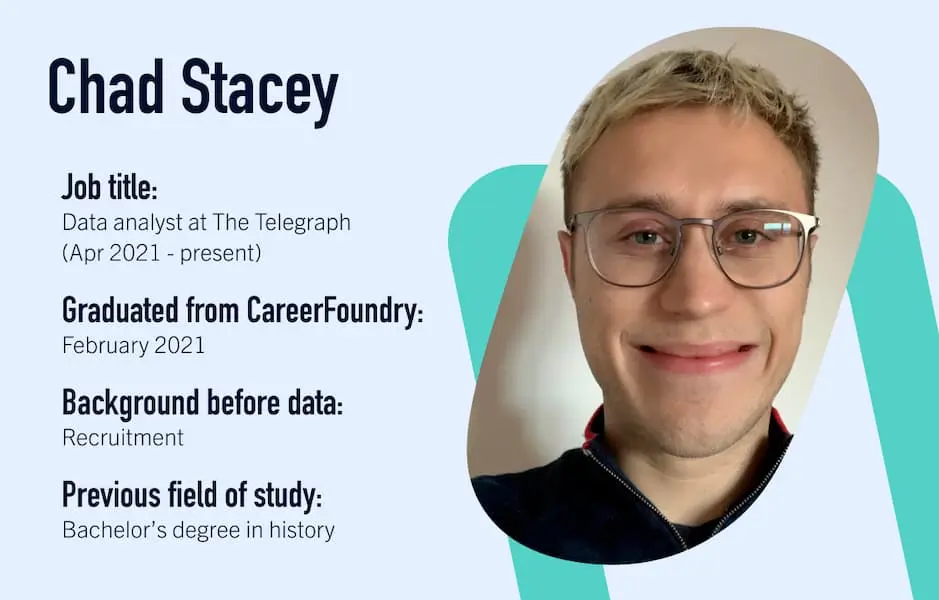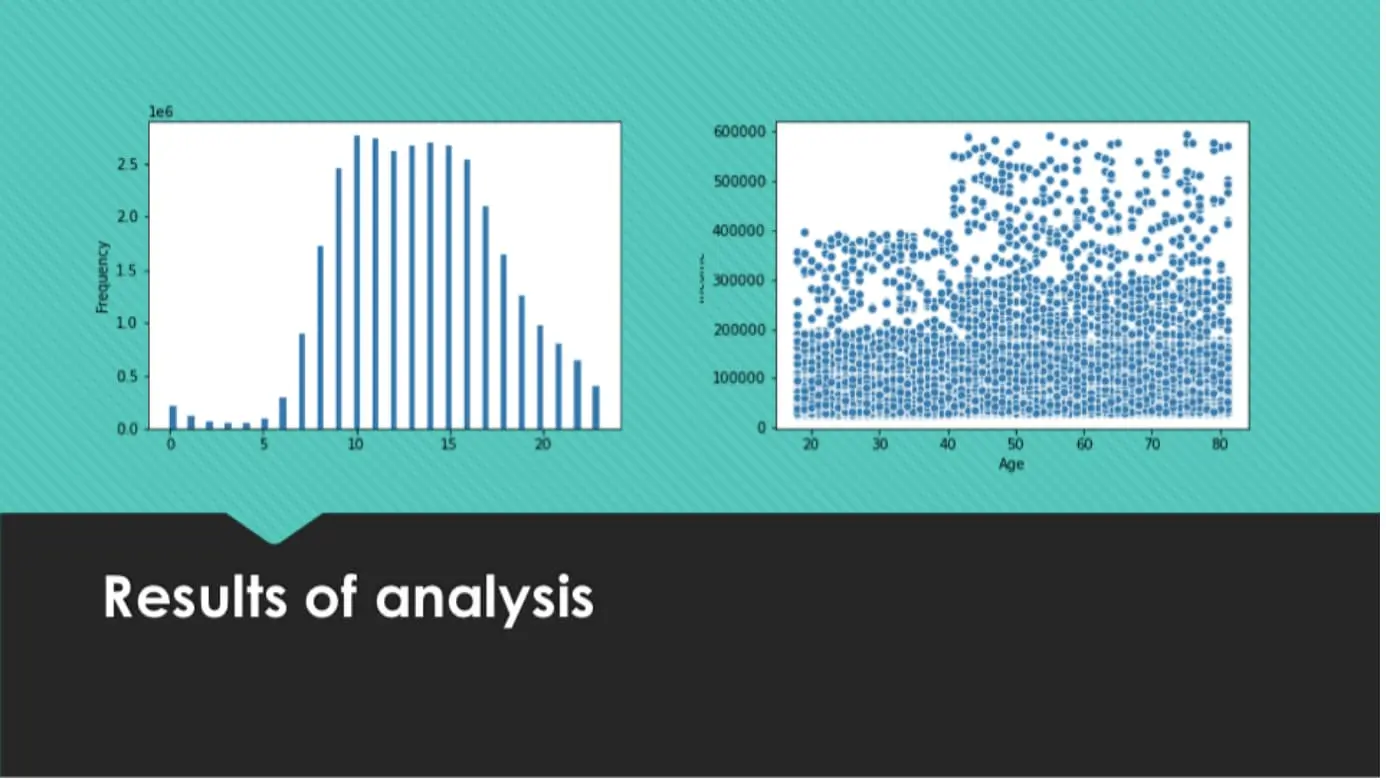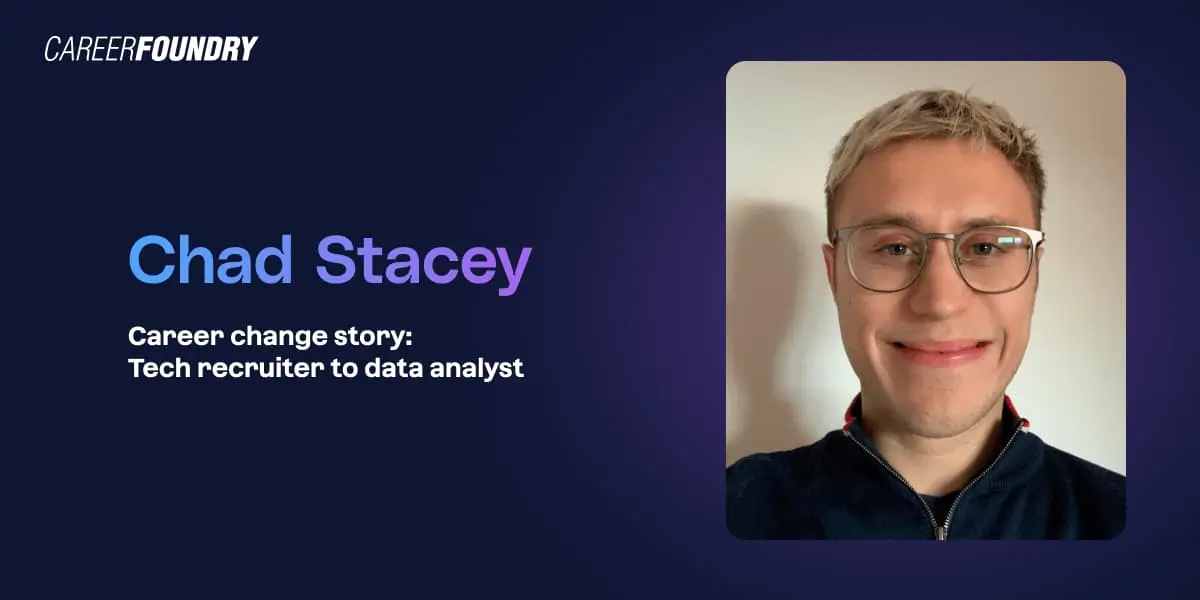Chad is a former tech recruiter who made a career change to data analytics. In this interview, Chad told us all about his experience on the Data Analytics Program at CareerFoundry and how it helped him land his dream job at The Telegraph.
Chad has always had an analytical mind, but when he graduated from university with a degree in history, he wasn’t sure what his future career path would be. While working as a tech recruiter, he learned more about the work of software engineers and data scientists—and decided that he, too, wanted to learn a valuable tech skill.
He boldly took the plunge, quit his job, and retrained for a career in data. He is now working as a data analyst at The Telegraph. I caught up with Chad to learn about his motivation to change careers, his experience studying with CareerFoundry, and how everything he learned on the program helped him land his dream job. Without further ado, this is how he made a career change from recruiting data analytics.

Hi Chad! Thanks for speaking with me today. To begin with, can you tell me a bit about yourself and what you were doing before CareerFoundry?
Hi! Sure. I studied history at Newcastle University in the UK. I loved it so much but when I graduated, I didn’t really know what I wanted to do with that degree. I had chosen to study history because I really enjoyed it at school and I was quite good at it, but I wasn’t thinking of becoming a historian or a teacher or something along that route.
So, my friend and I actually moved to Australia on a working holiday visa, where I did some sales and marketing roles. When I came back to the UK, I was looking for a job in London and there were a lot of opportunities in recruitment.
Having sales and marketing experience and being the people-person that I am, I naturally fell into recruitment and spent three years working at a startup, which then transitioned into a larger company. As it got bigger, the culture changed, and I just wasn’t enjoying it as much.
Sorry to hear that. What made you want to make a career change to data analytics?
I was really immersed in the world of technology in my job because we were recruiting for software engineers and data scientists. Looking at those types of careers, I thought, this is really interesting stuff—I want to learn a skill like this.
Why did you want to become a data analyst?
I had studied maths at A Level and I have a mathematical brain, but felt like I hadn’t used it in years. However, I developed an analytical mind studying history at university. Even though it deals with qualitative data (as opposed to quantitative) you’re still utilizing that part of your brain—it’s problem-solving.
I enjoyed picking apart a source and working out how accurate and trustworthy it is and how you can apply it, which you can of course apply to data, so I decided it was the route to go down.
Yes! It’s really important to find those transferable skills and apply them to your new field. How did you come across CareerFoundry?
I was doing my research in summer 2020, in the height of the pandemic. I was looking for something that was remote, but that had probably always been remote, and where the quality of the tuition hadn’t been affected by the fact that studies have been forced online.
So CareerFoundry jumped out at me because it was always fully online. I thought it’s remote, it’s flexible, I can do it at my own pace—it fit the bill for me. So I took the plunge and I quit my job. I know the courses are designed so you can complete them alongside a full-time job, but I wanted to do it as quickly as possible really, and I felt like I had already mentally quit my job.
I was perhaps a little bit nervous by the fact that it was such a new course for CareerFoundry. At this point, there weren’t a lot of testimonials from people who’d already completed the program because I was probably among one of the first cohorts of students, but based on what graduates were saying about the other courses and programs at CareerFoundry, I felt sure that this one would be good as well.
Can you tell me about your experience with the Data Analytics Program?
It’s really well put-together. One of the best things for me was how my tutor seemed available for me to speak to 24/7. Same goes for my mentor. He told me we can speak whenever, and we ended up having a couple of calls a week sometimes. I probably overdid how many hours I was actually allowed! But he didn’t mind; he was a great guy who was incredibly knowledgeable and always happy to take the time to look at my work and give me ideas. I think the one-to-one tutor and mentorship model is great.
There’s obviously a lot to learn in the program. Sometimes I’d get to the end of an achievement and think, wow, that’s a huge amount of information I’ve just digested. I don’t know how I’m going to apply that. But like I said, my mentor and tutor were both very vocal in their support and very encouraging.
I can be quite an impatient person but the way the program is structured worked in my favor. Also, I had to put myself in a position where I felt like I didn’t have a choice but to succeed, because I’d quit my job.
How did you find using new software and learning how to use new tools, with little or no prior experience?
In terms of the tools themselves, I had used Excel before but not at an advanced stage, which I learned in the program. I learned SQL, which I am using regularly in my current job at The Telegraph. I also learned Python, and while I don’t actually use it in my role at the moment, it is something that I’d like to pursue later on in my career, transitioning into data science for example.
It’s complex stuff, but the way that CareerFoundry taught it made it so much easier to understand.
 Having made a career change from recruiting, do you feel like the program helped you upskill for a career in data?
Having made a career change from recruiting, do you feel like the program helped you upskill for a career in data?
Yes, 100%. You don’t finish the program as an expert, but you touch upon a number of different concepts which, when you’re in the job search, help you come across as quite a well-rounded, if inexperienced, analyst, and someone who’s happy to try different things and is willing to learn. CareerFoundry gives you exposure to a lot of different facets of data analytics, so you come across as someone who can turn that knowledge into anything, and is adaptable.

Want to learn more about Chad’s project? Check out his main portfolio piece.
What would you say to someone reading this who is taking a CareerFoundry program now? Do you have any advice to share?
You’ve got to set small targets for yourself and try not to feel too overwhelmed about the volume of work, because there is a huge amount to get through. If you aren’t working a full-time role, treat CareerFoundry as the normal hours you might work, say Monday to Friday, and perhaps the odd weekend here and there. Work in small, manageable chunks—that was the best way for me.
What would you say has been the biggest challenge or learning curve for you during this time?
I can get quite frustrated and can be quite impatient at times. Since re-training and starting working at The Telegraph, I’ve learned to trust the process. I used to be the kind of person that got very frustrated if I couldn’t understand something straight away or at least, you know, after a couple of times of explaining. I’m definitely much, much better at that now. I think that partly just comes with maturing as a person and gaining more experience, but also with the skills that CareerFoundry teaches you.
You started working for The Telegraph as a data analyst just a few months after you completed the program. Congratulations! What was the job searching phase like?
It was a little bit daunting at first because I knew I was basically a complete novice in the industry. And perhaps some of the candidates that I was up against had more experience. But I think I was quite lucky having worked three years in a recruitment job. I had a bit of an advantage because I know how the recruitment process works.
Obviously, I needed some interview practice to ensure that I could apply myself to data and analytics roles. I spoke to my career advisor and he told me the specific modules to focus on in the Job Prep Course.
I applied for so many roles (even ones I didn’t find that interesting on paper) because I know how important interview experience is. The Telegraph was definitely my number one choice, though.
Well that’s good to hear! What was the recruitment process like with The Telegraph?
It was great because they moved so quickly, unlike some other companies I was also interviewing with. It involved a home task with a section to complete in Excel, and then one which used SQL and Excel to put together a presentation. It was so similar to the exercises I was doing with CareerFoundry, so I was really able to apply my knowledge there. I spent a long time on it because I was really keen on the role.
 Apart from the technical task, I had an hour or two of calls, which were more like behavioral and personality interviews, to check that I was a good cultural fit. They said they really liked me and they treated me really well throughout all the interview stages. It was a really enjoyable process actually.
Apart from the technical task, I had an hour or two of calls, which were more like behavioral and personality interviews, to check that I was a good cultural fit. They said they really liked me and they treated me really well throughout all the interview stages. It was a really enjoyable process actually.
It sounds like it was meant to be! Can you tell me a bit about your role?
Sure. I didn’t actually get the job I applied for, but they opened up some positions in a sister team and offered me a role there. I initially applied for a data analyst role in the CRM team. It was a job in editorial, analyzing how well a particular article does, why people want to read it, and how you can use that information to generate more revenue for the company. But I was offered a job in subscriptions instead.
It’s the same department—we all sit in what’s called ‘Insight & Analytics.’ I really like the subscriptions team. We’re more focused on subscribers’ data, and how we can increase the subscriber base.
What is a typical day like for you as a data analyst?
The teams at The Telegraph are really cross-functional. What generally happens is that requests come through from our main stakeholders, or the acquisition team, or the retention team. They might ask us to build a data studio report, or identify a certain group of people that they want to target. That involves going into the database and writing SQL code to get a selection of the right people they are looking for.
I use Adobe Analytics frequently as well, which involves looking at hit logs, analyzing people’s engagement with the website, and figuring out how you can utilize that information. There’s lots of variety.
It sounds great, and like you are really thriving. How has your life changed since CareerFoundry?
 Recruitment can be quite a lucrative industry, but after a while, money’s not interesting when you’re not enjoying yourself. What I do now is such a nice contrast to what I was doing before, so my career change from recruiting was well worth it.
Recruitment can be quite a lucrative industry, but after a while, money’s not interesting when you’re not enjoying yourself. What I do now is such a nice contrast to what I was doing before, so my career change from recruiting was well worth it.
And this is just the beginning. This is 100% what I want to do now, and I feel like there’s so much ahead of me—so much to learn and hopefully some significant career progression as well!
On that topic, what are your hopes for the future?
Industry wise, I’m a big sports fan, and sports analytics is huge now. Pretty much every successful sports team now employs a team of scientists or analysts to try and get the extra one percent on the pitch and breed success. I find that so interesting. I’d love to work for a sports analytics company that provides this data to teams, or to work for a team in that kind of capacity.
Also, maybe transitioning to data science in the future, which may be more difficult without a statistics degree, but let’s see—you never know.
Wow, what a great ambition! One last question from me: What advice would you give to anyone who is looking at studying an online course, or looking to kick-start their career in data?
The main thing I would say is just take the plunge. If you’re already looking to career change to data (or any industry for that matter), there’s a reason that you’re looking for that change. As long as you really commit to whatever it is that you’re going to do, then there’s no reason why you should fail, or why you shouldn’t absolutely love it. It is a scary position to be in when you’re basically starting afresh. But my advice would be to just go for it.
Thanks Chad, it’s been great chatting with you and learning more about your career-change journey. You sound like you’re really happy in your role now and I’m excited to see what the future holds for you!
Do you want to be a data analyst, like Chad? Get a taster of data analytics with CareerFoundry’s practical, free, introductory short course. And, if you’d like some help figuring out your options for a career change, we can recommend speaking with one of our program advisors.
If you’re looking for more inspiration from others who have made a career change to data analytics, check out these success stories:

 Having made a career change from recruiting, do you feel like the program helped you upskill for a career in data?
Having made a career change from recruiting, do you feel like the program helped you upskill for a career in data?